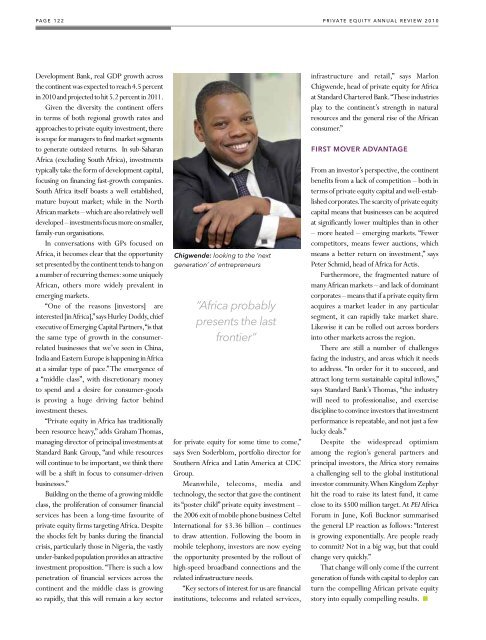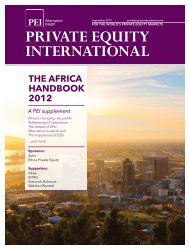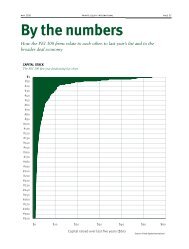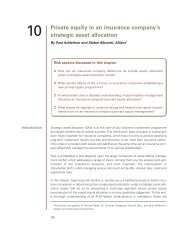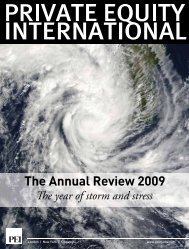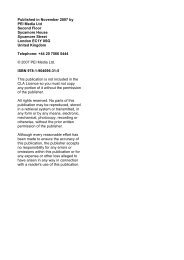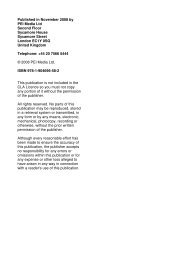THE ANNUAL REVIEW 2010 - PEI Media
THE ANNUAL REVIEW 2010 - PEI Media
THE ANNUAL REVIEW 2010 - PEI Media
Create successful ePaper yourself
Turn your PDF publications into a flip-book with our unique Google optimized e-Paper software.
page 122 private equity annual review <strong>2010</strong><br />
Development Bank, real GDP growth across<br />
the continent was expected to reach 4.5 percent<br />
in <strong>2010</strong> and projected to hit 5.2 percent in 2011.<br />
Given the diversity the continent offers<br />
in terms of both regional growth rates and<br />
approaches to private equity investment, there<br />
is scope for managers to find market segments<br />
to generate outsized returns. In sub-Saharan<br />
Africa (excluding South Africa), investments<br />
typically take the form of development capital,<br />
focusing on financing fast-growth companies.<br />
South Africa itself boasts a well established,<br />
mature buyout market; while in the North<br />
African markets – which are also relatively well<br />
developed – investments focus more on smaller,<br />
family-run organisations.<br />
In conversations with GPs focused on<br />
Africa, it becomes clear that the opportunity<br />
set presented by the continent tends to hang on<br />
a number of recurring themes: some uniquely<br />
African, others more widely prevalent in<br />
emerging markets.<br />
“One of the reasons [investors] are<br />
interested [in Africa],” says Hurley Doddy, chief<br />
executive of Emerging Capital Partners, “is that<br />
the same type of growth in the consumerrelated<br />
businesses that we’ve seen in China,<br />
India and Eastern Europe is happening in Africa<br />
at a similar type of pace.” The emergence of<br />
a “middle class”, with discretionary money<br />
to spend and a desire for consumer-goods<br />
is proving a huge driving factor behind<br />
investment theses.<br />
“Private equity in Africa has traditionally<br />
been resource heavy,” adds Graham Thomas,<br />
managing director of principal investments at<br />
Standard Bank Group, “and while resources<br />
will continue to be important, we think there<br />
will be a shift in focus to consumer-driven<br />
businesses.”<br />
Building on the theme of a growing middle<br />
class, the proliferation of consumer financial<br />
services has been a long-time favourite of<br />
private equity firms targeting Africa. Despite<br />
the shocks felt by banks during the financial<br />
crisis, particularly those in Nigeria, the vastly<br />
under-banked population provides an attractive<br />
investment proposition. “There is such a low<br />
penetration of financial services across the<br />
continent and the middle class is growing<br />
so rapidly, that this will remain a key sector<br />
Chigwende: looking to the ‘next<br />
generation’ of entrepreneurs<br />
“Africa probably<br />
presents the last<br />
frontier”<br />
for private equity for some time to come,”<br />
says Sven Soderblom, portfolio director for<br />
Southern Africa and Latin America at CDC<br />
Group.<br />
Meanwhile, telecoms, media and<br />
technology, the sector that gave the continent<br />
its “poster child” private equity investment –<br />
the 2006 exit of mobile phone business Celtel<br />
International for $3.36 billion – continues<br />
to draw attention. Following the boom in<br />
mobile telephony, investors are now eyeing<br />
the opportunity presented by the rollout of<br />
high-speed broadband connections and the<br />
related infrastructure needs.<br />
“Key sectors of interest for us are financial<br />
institutions, telecoms and related services,<br />
infrastructure and retail,” says Marlon<br />
Chigwende, head of private equity for Africa<br />
at Standard Chartered Bank. “These industries<br />
play to the continent’s strength in natural<br />
resources and the general rise of the African<br />
consumer.”<br />
first mover advantage<br />
From an investor’s perspective, the continent<br />
benefits from a lack of competition – both in<br />
terms of private equity capital and well-established<br />
corporates. The scarcity of private equity<br />
capital means that businesses can be acquired<br />
at significantly lower multiples than in other<br />
– more heated – emerging markets. “Fewer<br />
competitors, means fewer auctions, which<br />
means a better return on investment,” says<br />
Peter Schmid, head of Africa for Actis.<br />
Furthermore, the fragmented nature of<br />
many African markets – and lack of dominant<br />
corporates – means that if a private equity firm<br />
acquires a market leader in any particular<br />
segment, it can rapidly take market share.<br />
Likewise it can be rolled out across borders<br />
into other markets across the region.<br />
There are still a number of challenges<br />
facing the industry, and areas which it needs<br />
to address. “In order for it to succeed, and<br />
attract long term sustainable capital inflows,”<br />
says Standard Bank’s Thomas, “the industry<br />
will need to professionalise, and exercise<br />
discipline to convince investors that investment<br />
performance is repeatable, and not just a few<br />
lucky deals.”<br />
Despite the widespread optimism<br />
among the region’s general partners and<br />
principal investors, the Africa story remains<br />
a challenging sell to the global institutional<br />
investor community. When Kingdom Zephyr<br />
hit the road to raise its latest fund, it came<br />
close to its $500 million target. At <strong>PEI</strong> Africa<br />
Forum in June, Kofi Bucknor summarised<br />
the general LP reaction as follows: “Interest<br />
is growing exponentially. Are people ready<br />
to commit? Not in a big way, but that could<br />
change very quickly.”<br />
That change will only come if the current<br />
generation of funds with capital to deploy can<br />
turn the compelling African private equity<br />
story into equally compelling results. n


